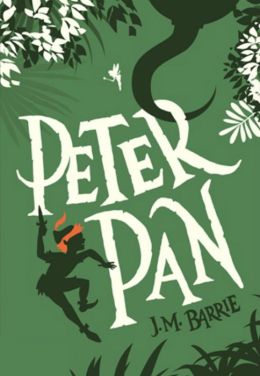Book #15
Peter Pan by J.M. Barrie
Wendy, Michael and John are sleeping when the window of their nursery blows open and lets in a very remarkable boy, Peter Pan, and his fairy, Tinker Bell. Peter soon entices the three children from their beds and out through the window to Neverland. There, they encounter mermaids, fairies, the Lost Boys, the Indian princess Tiger Lily and her tribe, and do battle with an villainous gang of pirates and the sinister Captain Hook.
Peter Pan is a story we're all familiar with; the boy who never grew up. It's a heartwarming adventure story for children, with Wendy, John, and Michael being uplifted from their beds and flown to Neverland to battle pirates, redskins, and a ticking crocodile.
The novel is really nothing like its Disney interpretation. Peter is a cocky wee shit rather than a profound philosopher, doing whatever he can to maintain his hold over the children and the lost boys. This usually comes in the form of emotional abuse or gaslighting. Barrie almost seems to imply that children are heartless, selfish and cruel, at the same time hinting that every child needs a mother. If Pan hadn't lost his mother, and hadn't been given free reign of Neverland, would his traits be the same? He decides he and the lost boys need a mother, so kidnaps Wendy from her bed to become mother to them all. He does this knowing that in doing so, Wendy, John, and Michael will lose their own mother.
Wendy doesn't come across well either (although I've never liked her), by encouraging Pan's behaviour, and by the time she grows up allows her children and grandchildren to fly to Neverland to do Peter's spring cleaning! She remembers fondly the time she was kidnapped by pirates, or marooned and left to die on a rock in the middle of the lagoon, and sends her offspring off to their potential deaths. Well in, Wendy, you plum.
Adults can appreciate adventure too, but reading this as an older person (never an adult), I could see Barrie's depiction of the Darling parents' pain over the loss of their children. Mrs Darling never closing the window, and Mr Darling resolving to live in Nana's kennel until the children return. Barrie wrote the novel as testament to his older brother who died the day before his fourteenth birthday; the real boy who never grew up. It's plain to see Barrie show us his own mother's pain through Mrs Darling, and it's a real heartbreaker to read of the lost boys missing their mother whilst she is missing them.
Despite Peter Pan's darker themes, there is something really magical about this book. I'm sure we'd all, at some point, like to open our windows and fly off into the night, ending up in a new world.

